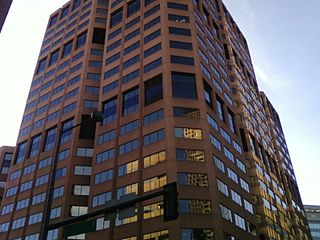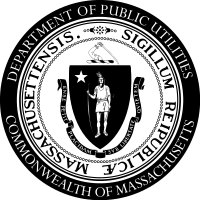
The Federal Communications Commission (FCC) is an independent agency of the United States government that regulates communications by radio, television, wire, satellite, and cable across the United States. The FCC maintains jurisdiction over the areas of broadband access, fair competition, radio frequency use, media responsibility, public safety, and homeland security.

The Communications Act of 1934 is a United States federal law signed by President Franklin D. Roosevelt on June 19, 1934, and codified as Chapter 5 of Title 47 of the United States Code, 47 U.S.C. § 151 et seq. The act replaced the Federal Radio Commission with the Federal Communications Commission (FCC). It also transferred regulation of interstate telephone services from the Interstate Commerce Commission to the FCC.

A public utility company is an organization that maintains the infrastructure for a public service. Public utilities are subject to forms of public control and regulation ranging from local community-based groups to statewide government monopolies.

The National Telecommunications and Information Administration (NTIA) is an agency of the United States Department of Commerce that serves as the president's principal adviser on telecommunications policies pertaining to the United States' economic and technological advancement and to regulation of the telecommunications industry.

The telecommunications policy of the United States is a framework of law directed by government and the regulatory commissions, most notably the Federal Communications Commission (FCC). Two landmark acts prevail today, the Communications Act of 1934 and the Telecommunications Act of 1996. The latter was intended to revise the first act and specifically to foster competition in the telecommunications industry.
Eversource Energy is a publicly traded, Fortune 500 energy company headquartered in Hartford, Connecticut, and Boston, Massachusetts, with several regulated subsidiaries offering retail electricity, natural gas service and water service to approximately 4 million customers in Connecticut, Massachusetts, and New Hampshire.
A public utilities commission is a quasi-governmental body that provides oversight and/or regulation of public utilities in a particular area, especially in the United States and Canada.
The Minnesota Public Utilities Commission (MPUC) is an independent regulatory agency within the U.S. state of Minnesota responsible for the oversight and regulation of public utilities, including electric, natural gas, and telecommunications services. Created by the Minnesota Legislature, the commission's primary mission is to ensure that residents of Minnesota have access to safe, adequate, and efficient utility services at fair, reasonable rates. It plays a significant role in balancing the needs of consumers, the environment, and utility companies.

The California Public Utilities Commission is a regulatory agency that regulates privately owned public utilities in the state of California, including electric power, telecommunications, natural gas and water companies. In addition, the CPUC regulates common carriers, including household goods movers, limousines, rideshare services, self-driving cars, and rail crossing safety. The CPUC has headquarters in the Civic Center district of San Francisco, and field offices in Los Angeles and Sacramento.

The Oklahoma Corporation Commission is the public utilities commission of the U.S state of Oklahoma run by three statewide elected commissioners. Authorized to employ more than 500 employees, it regulates oil and gas drilling, utilities and telephone companies.
The Florida Public Service Commission (FPSC) regulates investor-owned electric, natural gas, and water and wastewater utilities. The FPSC facilitates competitive markets in the telecommunications industry, has authority over intercarrier disputes, and oversees pay telephones, the federal Lifeline Assistance Program and Telecommunications Relay Service.

The Public Utilities Commission of the State of Colorado (PUC) provides regulatory oversight of public utilities in the State of Colorado of the United States.

The Land Transportation Franchising and Regulatory Board is an agency of the Republic of the Philippines under the Department of Transportation (DOTr). The LTFRB was established on June 19, 1987, during the former president Corazon Aquino’s administration.
The National Association of Regulatory Utility Commissioners (NARUC) is the national association representing the U.S. state public service commissioners who regulate essential utility services, including energy, telecommunications, and water. Founded in 1889, the Association is a resource for its members and the regulatory community, providing a venue to set and influence public policy, share best practices, and foster solutions to improve regulation.

The Mississippi Public Service Commission is a government agency which regulates telecommunications, electric, gas, water and sewer utilities in the U.S. state of Mississippi. The commission was created in 1884 and in its early history was tasked with regulating various transport and telecommunications industries in the state. It assumed its current name in 1938 and was given jurisdiction over electric, gas, and water utilities in 1956.
The North Carolina Utilities Commission is a government agency that regulates the various utilities of the state of North Carolina. The Commission also regulates household goods transportation, buses, brokers and ferryboats.
Communications law refers to the regulation of electronic communications by wire or radio. It encompasses regulations governing broadcasting, telephone and telecommunications service, cable television, satellite communications, wireless telecommunications, and the Internet.
The Manx Utilities Authority is a Statutory Board of the Isle of Man Government which provides utilities for the Isle of Man. It was created in 2014 by the merging of the Manx Electricity Authority with the Isle of Man Water and Sewerage Authority.
The Everett, Massachusetts train crash was a railway accident that occurred on December 28, 1966, when a train struck a stalled tank truck, killing 13 people.

Utility repair tag is a plastic color-coded pavement marker embedded in the top surface of an asphalt utility cut restoration to identify the responsible party of that pavement repair or patch. The tag is not to be used for identification of an underground utility location.











